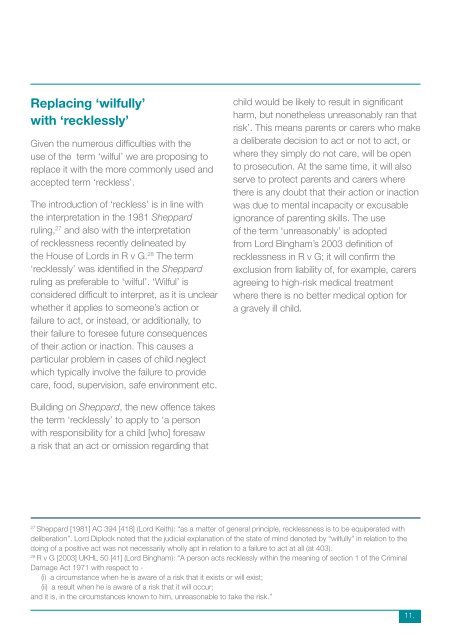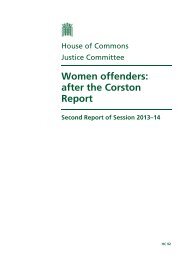Our proposed alternative offence<strong>The</strong> Advisory Group has sought to drafta succinct, clear <strong>and</strong> workable alternativeoffence, <strong>and</strong> to:• cover the full range of harm done to<strong>neglect</strong>ed <strong>child</strong>ren, specifically includingnon-physical harm;• replace the widely misunderstoodterm ‘wilfully’ with the clearer termof ‘recklessness’;• provide a <strong>criminal</strong> <strong>law</strong> counterpart to thecivil <strong>law</strong> (<strong>Children</strong> Act 1989, sections 17<strong>and</strong> 39), facilitating shared practicesin collecting <strong>and</strong> evaluating evidenceacross agencies by the use of commondefinitions <strong>and</strong> in<strong>for</strong>mation; <strong>and</strong>• avoid the <strong>criminal</strong>isation of vulnerableparents who are in need of guidancerather than punishment <strong>for</strong> their behaviour.We believe that the case <strong>for</strong> re<strong>for</strong>m isoverwhelming, <strong>and</strong> that tinkering with thecurrent provision will not suffice. We areproposing to repeal section 1 of the <strong>Children</strong><strong>and</strong> Young Persons Act 1933 – removingall five conduct elements of the currentoffence, the term wilfully, antiquated termssuch as ‘unnecessary suffering’, ‘mentalderangement’, <strong>and</strong> the entirety of section1(2)(b) which is an anachronistic statutoryexample of the offence concerning cosleepingwith an infant in a bed whilst whiledrunk from alcohol.A new offence of <strong>child</strong>maltreatment“s.1Child maltreatment(1) It is an offence <strong>for</strong> a person who has attainedthe age of 16 years with responsibility <strong>for</strong>a <strong>child</strong> intentionally or recklessly to subjectthat <strong>child</strong> or allow that <strong>child</strong> to be subjectedto maltreatment, whether by act or omission,such that the <strong>child</strong> suffers, or is likely tosuffer, significant harm.(2) For the purposes of this section:(a) ‘recklessly’ shall mean that a personwith responsibility <strong>for</strong> a <strong>child</strong> <strong>for</strong>esaw arisk that an act or omission regarding that<strong>child</strong> would be likely to result in significantharm, but nonetheless unreasonably tookthat risk;(b) ‘responsibility’ shall be as defined insection 17; 24(c) ‘maltreatment’ includes:(i) <strong>neglect</strong> (including ab<strong>and</strong>onment),(ii) physical abuse,(iii) sexual abuse,(iv) exploitation, <strong>and</strong>(v) emotional abuse;(d) ‘harm’ means the impairment of: 25(i) physical or mental health, or(ii) physical, intellectual, emotional, social orbehavioural development.(3) Where the question of whether harm sufferedby a <strong>child</strong> is significant turns on the <strong>child</strong>’shealth or development, that <strong>child</strong>’s healthor development shall be compared with thatwhich could reasonably be expected of asimilar <strong>child</strong>.” 2624As amended by the <strong>Children</strong> Act 1989.25Definition drawn from <strong>Children</strong> Act 1989, s.31(9), but with ‘ill-treatment’ omitted, as being circular <strong>and</strong> also illogical sinceill-treatment is conduct, not a consequence.26Section adopted from the <strong>Children</strong> Act 1989 section 31(10).10.
Replacing ‘wilfully’with ‘recklessly’Given the numerous difficulties with theuse of the term ‘wilful’ we are proposing toreplace it with the more commonly used <strong>and</strong>accepted term ‘reckless’.<strong>The</strong> introduction of ‘reckless’ is in line withthe interpretation in the 1981 Sheppardruling, 27 <strong>and</strong> also with the interpretationof recklessness recently delineated bythe House of Lords in R v G. 28 <strong>The</strong> term‘recklessly’ was identified in the Sheppardruling as preferable to ‘wilful’. ‘Wilful’ isconsidered difficult to interpret, as it is unclearwhether it applies to someone’s action orfailure to act, or instead, or additionally, totheir failure to <strong>for</strong>esee future consequencesof their action or inaction. This causes aparticular problem in cases of <strong>child</strong> <strong>neglect</strong>which typically involve the failure to providecare, food, supervision, safe environment etc.<strong>child</strong> would be likely to result in significantharm, but nonetheless unreasonably ran thatrisk’. This means parents or carers who makea deliberate decision to act or not to act, orwhere they simply do not care, will be opento prosecution. At the same time, it will alsoserve to protect parents <strong>and</strong> carers wherethere is any doubt that their action or inactionwas due to mental incapacity or excusableignorance of parenting skills. <strong>The</strong> useof the term ‘unreasonably’ is adoptedfrom Lord Bingham’s 2003 definition ofrecklessness in R v G; it will confirm theexclusion from liability of, <strong>for</strong> example, carersagreeing to high-risk medical treatmentwhere there is no better medical option <strong>for</strong>a gravely ill <strong>child</strong>.Building on Sheppard, the new offence takesthe term ‘recklessly’ to apply to ‘a personwith responsibility <strong>for</strong> a <strong>child</strong> [who] <strong>for</strong>esawa risk that an act or omission regarding that27Sheppard [1981] AC 394 [418] (Lord Keith): “as a matter of general principle, recklessness is to be equiperated withdeliberation”. Lord Diplock noted that the judicial explanation of the state of mind denoted by “wilfully” in relation to thedoing of a positive act was not necessarily wholly apt in relation to a failure to act at all (at 403).28R v G [2003] UKHL 50 [41] (Lord Bingham): “A person acts recklessly within the meaning of section 1 of the CriminalDamage Act 1971 with respect to -(i) a circumstance when he is aware of a risk that it exists or will exist;(ii) a result when he is aware of a risk that it will occur;<strong>and</strong> it is, in the circumstances known to him, unreasonable to take the risk.”11.
















